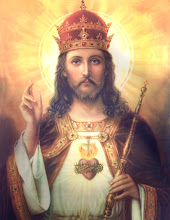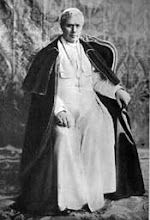Conforme havia prometido, aqui deixo o meu contributo para a compreensão do sentido em que a Igreja Católica condena o liberalismo. Tal doutrina não é a que sobraça a defesa da propriedade privada, da livre empresa e da iniciativa pessoal, ainda que os seus excessos sejam também rigorosamente condenados pela Doutrina Social da Igreja, mas antes a que sufraga o relativismo e indiferentismo moral, e que, afinal, se subsume ao esquerdismo contemporâneo.
Neste último sentido, uma excelente súmula do que vem a ser o liberalismo, é-nos transmitida pelo notável livro dos Padres Farncisco e Dominic Radecki, CMRI, "Tumultuous Times", obra que só não recomendo absolutamente por os seus autores adoptarem nela uma postura sedevacantista.
Passo a transcrever a definição que os mesmos dão do liberalismo:
"Martin Luther and heretics of the 16th century had rejected the teaching authority of the Catholic Church and proclaimed the supremacy of the individual conscience in matters of religion. This ideology had a profound influence upon Western Europe. " 'The Mind of Europe,' writes Peter Wust, 'was secularized, the world stripped of its sacred meaning, the Church ruled out of public affairs, God dethroned in the soul of man.' "
There are four basic principles inherent in Liberalism:
- The absolute sovereignity of the individual and his entire independence of God and God's authority.
- The absolute sovereignity of society in its entire independence of everything which does not proceed from itself.
- Absolute civil sovereignity in the implied right of the people to make their own laws in entire independence and utter disregard of any other criterion han the popular will expressed at the polls.
- Absolute freedom of thought in politics, morals, or in religion. The unrestrained liberty of the press.
Anne Carroll defines Liberalism as "a philosophy which rejects moral absolutes and authority, especially religious authority. It is usually opposed to hereditary monarchy. It emphasizes that men should be free to do whatever they want in moral matters. It usually approves the elimination of opposition, by violence if necessary.
Liberalism is based on the absolute independence of the individual, society and the State from God and His Church. The Catholic Church is founded on the absolute subjection of the individual and society to the revealed law of God. These two ideologies are irreconcilable. Liberalism has been repeatedly condemned by a sucession of popes from Gregory XVI to Pius XII because it is the very antithesis of Catholicism. Pope Leo XIII describes the inherent evils of this false philosophy:
"... Man, by a necessity of his nature, is wholly subjected to the most faithful and ever enduring power of God, and that, as a consequence, any liberty except that which consists in submission to God and in submission to His will is unintelligible. To deny the existence of this authority in God, or to refuse to submit to it, means to act, not as a free man, but as one who treasonably abuses his liberty; and in such a disposition of mind the chief and deadly vice of Liberalism essentially consists".
JSarto
Neste último sentido, uma excelente súmula do que vem a ser o liberalismo, é-nos transmitida pelo notável livro dos Padres Farncisco e Dominic Radecki, CMRI, "Tumultuous Times", obra que só não recomendo absolutamente por os seus autores adoptarem nela uma postura sedevacantista.
Passo a transcrever a definição que os mesmos dão do liberalismo:
"Martin Luther and heretics of the 16th century had rejected the teaching authority of the Catholic Church and proclaimed the supremacy of the individual conscience in matters of religion. This ideology had a profound influence upon Western Europe. " 'The Mind of Europe,' writes Peter Wust, 'was secularized, the world stripped of its sacred meaning, the Church ruled out of public affairs, God dethroned in the soul of man.' "
There are four basic principles inherent in Liberalism:
- The absolute sovereignity of the individual and his entire independence of God and God's authority.
- The absolute sovereignity of society in its entire independence of everything which does not proceed from itself.
- Absolute civil sovereignity in the implied right of the people to make their own laws in entire independence and utter disregard of any other criterion han the popular will expressed at the polls.
- Absolute freedom of thought in politics, morals, or in religion. The unrestrained liberty of the press.
Anne Carroll defines Liberalism as "a philosophy which rejects moral absolutes and authority, especially religious authority. It is usually opposed to hereditary monarchy. It emphasizes that men should be free to do whatever they want in moral matters. It usually approves the elimination of opposition, by violence if necessary.
Liberalism is based on the absolute independence of the individual, society and the State from God and His Church. The Catholic Church is founded on the absolute subjection of the individual and society to the revealed law of God. These two ideologies are irreconcilable. Liberalism has been repeatedly condemned by a sucession of popes from Gregory XVI to Pius XII because it is the very antithesis of Catholicism. Pope Leo XIII describes the inherent evils of this false philosophy:
"... Man, by a necessity of his nature, is wholly subjected to the most faithful and ever enduring power of God, and that, as a consequence, any liberty except that which consists in submission to God and in submission to His will is unintelligible. To deny the existence of this authority in God, or to refuse to submit to it, means to act, not as a free man, but as one who treasonably abuses his liberty; and in such a disposition of mind the chief and deadly vice of Liberalism essentially consists".
JSarto
















0 comentários:
Enviar um comentário